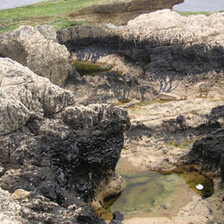Electronic Lebanon 28 July 2006
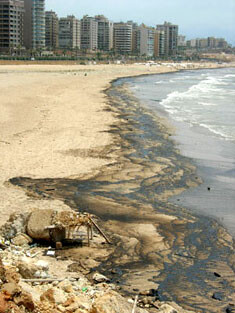
The oil spill has hit a wide swath of Lebanon’s coastline (Zena el-Khalil)
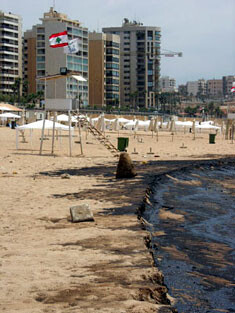
Lebanon’s tourism industry is further devastated by the environmental catstrophe (Zena el-Khalil)
The escalating Israeli attack on Lebanon is not only killing its civilians and destroying its infrastructure, but it is also annihilating its environment. Last week a 15,000 ton oil spill resulted from the Israeli air raid on the Jiyyeh power plant South of Lebanon. The power plant has six fuel tanks. Four of them have burned completely, while the fifth one, which is also the main cause of the spill, is still burning. The Lebanese Ministry of Environment is worried that the sixth tank, which is underground and so far intact, is going to explode and increase the magnitude of the problem.
The oil slick appeared for the first time last week on the once beautiful beach of Ramlet El-Beida in Beirut, which is (or now used to be) the only public beach that Beirutis can enjoy in the Lebanese capital. Upon this finding, several environmental activists alerted the media on the spill, which in turn has mobilized the municipality of Beirut and the Ministry of Environment. After a few days of investigation it became obvious that more than 100km of the Lebanese coast, from Jiyyeh in the South to Chekka in the North, has been hit by this oil spill.
Lebanese environmental NGOs have labeled the spill as the worst environmental crisis in Lebanon’s history. Just for the sake of comparison, in 2003 a 50 ton oil spill in the North by a cement company was a huge blow to the Lebanese coastal environment, and required a years clean up effort. The current spill is 300 times bigger, and there is a big possibility that more oil will go into the sea.
This spill will have a huge negative impact on the Mediterranean marine environment. The Lebanese coast is a very important site for fish spawning and sea turtle nesting, including the green turtle, which is an endangered species in the Mediterranean.
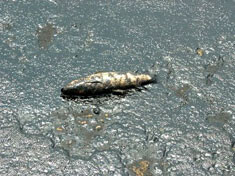
Lebanon’s wildlife has been severely impacted by the conflict (Zena el-Khalil)
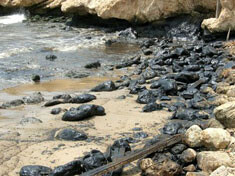
There are worries that a sixth, intact tank could burst as well (Zena el-Khalil)
During the month of July, turtle eggs start to hatch and all baby turtles will need to reach deep waters as fast as possible. With the oil slick in their way baby turtles will have no chance of making it. Also, Blue Fin Tuna, which is a very important commercial species in the Mediterranean and which has been under severe stress from over-fishing, are present in the Eastern Mediterranean coastal water in this period of the year. The oil spill, of which part of it has settled on the sea floor, will threaten the blue fin tuna and other fish species spawning areas.
Another important impact of the spill is the effect on tourism in the future. The Lebanese coast is an important tourist destination, and after the war ends, Lebanon will need every source of income to rebuild its infrastructure. Currently, the beautiful Lebanese white beaches are covered with a black layer and the smell of fuel can be smelled a good distance in land, rendering them toxic and useless.
According to media and the Ministry of Environment, this oil spill is bigger than what the local authority can handle and urgent help is needed from outside. The Ministry of Environment has organized a team to follow up on this issue, and have requested help from the United Nations Environmental Program and the Regional Marine Pollution Emergency Response Center for the Mediterranean (REMPEC). The Kuwaiti Environment Authority has responded to the Lebanese government call and promised to send equipment and expertise to help in the clean up. Nevertheless, the constant Israeli air raids will make the clean up operation very difficult. Last week, Israel targeted ambulances and aid trucks coming into the country. There is no guarantee that Israel will not target any equipment that approaches the beach, and clean up efforts might not be in place until a cease fire has been reached.
This spill will not be the only environmental impact of the attack on Lebanon. Other impacts include air pollution and chemical spills due to the targeting of industrial factories, fuel bunkers, and other flammable structures; the use of depleted uranium in Israeli bombs, and the huge waste and sanitary crisis resulting from the 750,000 refugees in Lebanon, which can lead to water pollution and the spread of diseases. A full assessment of the environmental impact of this war can only happen after the conflict is over and Lebanon should work with the international community on this issue.
Related Links
Wael Hmaidan was the Greenpeace Campaigner for the Arab World for the past three years. Currently he is an environmental activist and environmental policy advisor for Lebanese and regional NGOs. Contact information: Wael Hmaidan, mobile: +961-3-506313, email: whmaidan@care2.com.

